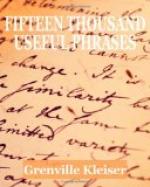One is almost exasperated by the repeated use and abuse of the word “intimate” in a recently published work of fiction, by an author who aspires to the first rank in his profession. He writes of “the intimate dimness of the room;” “a fierce intimate whispering;” “a look that was intimate;” “the noise of the city was intimate,” etc. Who has not heard, “The idea!” “What’s the idea?” “Is that the idea?” “Yes, that’s the idea,” with increased inflection at each repetition. And who is without a friend who at some time or another has not sprung “meticulous” upon him? Another example is afforded by the endemic use of “of sorts” which struck London while the writer was in that city a few years ago. Whence it came no one knew, but it was heard on every side. “She was a woman of sorts;” “he is a Tory of sorts;” “he had a religion of sorts;” “he was a critic of sorts.” While it originally meant “of different or various kinds,” as hats of sorts; offices of sorts; cheeses of sorts, etc., it is now used disparagingly, and implies something of a kind that is not satisfactory, or of a character that is rather poor. This, as Shakespeare might have said, is “Sodden business! There’s a stewed phrase indeed!” [Footnote: Troilus and Cressida, act iii, sc. 1.]
The abuse of phrases and the misuse of words rife among us can be checked by diligent exercises in good English, such as this book provides. These exercises, in conjunction with others to be found in different volumes by the same author, will serve to correct careless diction and slovenly speech, and lead to the art of speaking and writing correctly; for, after all, accuracy in the use of words is more a matter of habit than of theory, and once it is acquired it becomes just as easy to speak or to write good English as bad English. It was Chesterfield’s resolution not to speak a word in conversation which was not the fittest he could recall. All persons should avoid using words whose meanings they do not know, and with the correct application of which they are unfamiliar. The best spoken and the best written English is that which conforms to the language as used by men and women of culture—a high standard, it is true, but one not so high that it is unattainable by any earnest student of the English tongue. Frank H. VIZETELLY.




